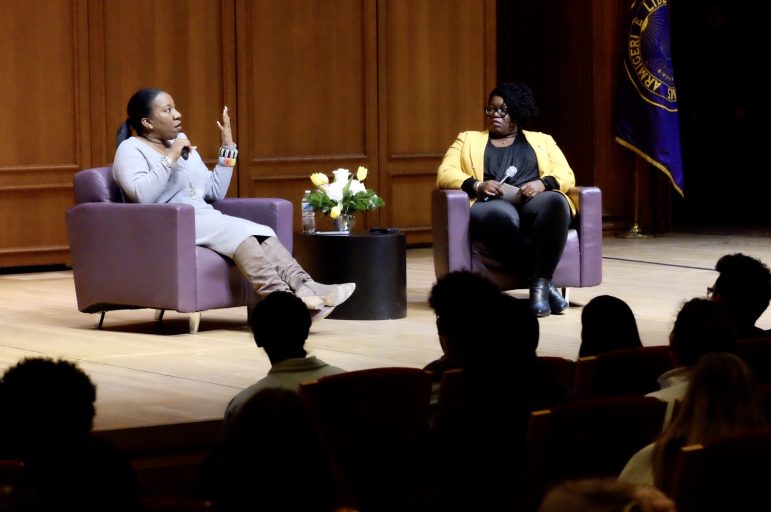#MeToo movement founder speaks on issues of sexual violence, race

Tarana Burke, founder of the #MeToo movement, spoke to the student body in the evening keynote for Claiming Williams Day on Thursday in Chapin Hall. Burke was interviewed by Associate Professor of Africana Studies and Faculty Affiliate in Religion Rhon Manigault-Bryant. The interview was intended to be, according to Manigault-Bryant, a “frank, candid conversation.”
Burke, who built her career in activism, founded Just Be Inc., which focuses on the wellbeing of women of color across the country, in 2003. The #MeToo movement, created by Burke, became popular in 2017 after actress Alyssa Milano sent a viral Tweet. In hope of bringing global attention to the issues of sexual assault, violence and abuse, Milano asked her followers, “If you’ve been sexually harassed or assaulted write ‘me too’ as a reply to this tweet.”
Burke asserts that the movement is not simply a temporary one but rather a continued fight and progression for justice. “A hashtag is not a movement,” Burke commented when asked about the popularity of the #MeToo hashtag.
Chapin Hall listened attentively to Burke’s experiences as a young girl living in the Bronx, learning how to be an organizer from her father. Her father, Wes, was the person whom people in her neighborhood would turn to when an issue needed to be fixed or a conflict had to be resolved. “When something happened in the community, they got Big Wes,” she said. “He knew how to bring people together.”
At one point, Burke was asked about starting the #MeToo movement and how she felt about its popularity, especially among white women. Manigault-Bryant asked Burke if she felt angry or upset at the fact that the movement had become so represented by the hashtag and Hollywood actresses taking over. “This is America,” Burke responded. “We are trained to respond to the vulnerability of white women. Now, it isn’t their fault. This [sexual abuse] is something that happened to them and we must recognize that.”
She asserted that the popularity and the broader conversation served to benefit her cause. Time Magazine named her, along with other influencers, a “silence breaker” Person of the Year in 2017.
Manigault-Bryant asked Burke for her advice to students at the College looking to make change. “Instant gratification is dangerous,” Burke said. “A movement takes time, much longer than the lifetime of just one person.” Burke quoted Rev. Martin Luther King Jr. by saying, “‘I’ve seen the mountain top, but I might not get there with you.’” Furthermore, she stated that this movement is not just her. It is not just her ideals or her leadership but a culmination of the work those did before her. Burke said that one day someone will come up to her and say, “Tarana, you don’t know what your talking about anymore,” and she will let them take the reins.
The conversation turned toward accountability of sexual harassers as well as those witnessing harassment. Burke talked about the reasons why perpetrators refuse to acknowledge what they did or people are afraid of being accused. She cited the hearings for Justice Brett Kavanaugh, stating that it would have been a very different hearing had he acknowledge his potential for misunderstanding.
Burke argues that sexual abuse is intolerable, and “we must create accountability.”








